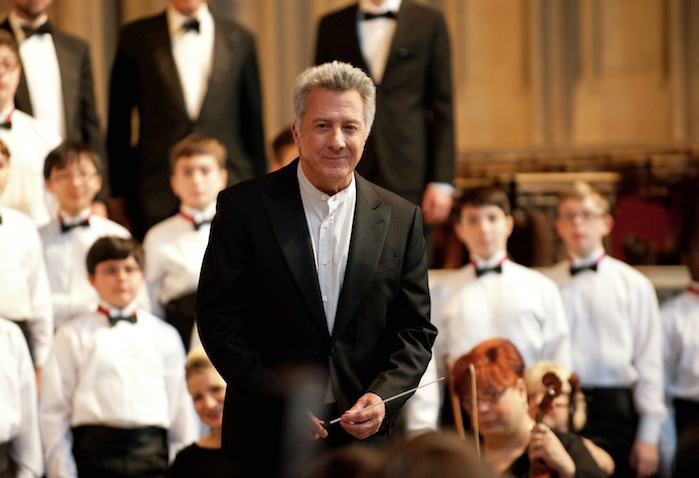
Screenwriter Ben Ripley has followed up his time-travel thriller “Source Code” in a most unpredictable way. From an adrenaline-fueled terrorist atmosphere to the private confines of a boy’s choir school, Ripley’s rather plainly titled “Boychoir” bursts with harmony and euphoric melody thanks to a group of supernaturally talented boys. Unfortunately, Ripley’s talents for thrills don’t transition well into a coming-of-age story, unadventurous direction by François Girard provides no support, and the film’s voice is broken before it hits any soulful heights.
Garrett Wareing plays Stet, a troubled youth whose attitude towards schoolwork and schoolmates is augmented by scorn and violent outbursts. Since he’s one of the brighter kids in his choir class, however, Stet follows the endless list of protagonists whose mischievous behavior is partly caused by being surrounded by inferiority. He comes home to a barely conscious, neglectful, boozing mother and proceeds to dump her bottle of Vodka in the sink for, what feels like, the fifth time that week. No, the one who recognizes Stet’s talent for singing is not his mother, but his teacher, Ms. Steel (Debra Winger), who has organized a visit from the American Boychoir at his school, and a private audition with renowned Choir Master Anton Carvelle (Dustin Hoffman). Carvelle’s time is precious, but Stet has no idea who he is, so he ditches without much hesitation. He comes back home to find out that his mother has been in a fatal accident, and Ms. Steel convinces his absentee father (Josh Lucas) that joining the Boychoir is the best thing for Stet. The father, still wishing to keep his son a secret from his current family back in New York, readily agrees.

This is how a boy’s choir school becomes an orphanage for Stet, who continues to be irresponsible and disrespectful. Making friends doesn’t prove easy, and pleasing Carvelle is even less so, but with Professor Wooly (Kevin McHale) and Headmistress Justine (Kathy Bates) to nudge him along, Stet grows confident and becomes determined to establish himself and not squander his talents. The boy can sing, and even with talented soloist Devon (Joe West) around, it’s Stet who could be the key for the school to sing in New York, on the greatest stage for boy choirs.
The ensemble cast is rounded off by a deliciously antagonistic Eddie Izzard as Carvelle’s second hand, and is second only to the music with regards to any value “Boychoir” has. Hoffman hovers around the edges, hardly permitting a smile, let alone a compliment, but in a few essential scenes the master veteran shows how much love and appreciation Carvelle has for the music and for the boys. One of these scenes is set in a basketball court, when Stet is asked to show his progress. Hoffman’s reaction is sublime acting, reminding us of his bottomless talents. The rest of the cast are solid all around, Bates and Izzard delivering the greatest one-liners in the film, and as far as first impressions go, you could do much worse than Wareing, who makes Stet’s sensitive troublemaker easy to watch, even if it’s a character we’ve met before.

The biggest qualm we have with “Boychoir” is precisely that: we’re watching stock characters going through customary motions and speaking words we’ve heard too many times before. We’d be lying if we said we weren’t disappointed, because Girard has “The Red Violin,” one of the shiniest hidden gems of the 1990s, under his belt. Music has very much been part of the director’s career thus far, whether it’s in film or in opera, but unlike his 1998 masterwork, “Boychoir” is flat, conventional, saccharine storytelling that is too far removed from any inspiration.
Thanks to a few exemplary moments of monumental acting from Hoffman, truly harmonious singing from the boys, and a graceful score by Brian Byrne, “Boychoir” is, at its best, a comfortable viewing and listening pleasure. Ripley and Girard don’t prove to be in tune with each other’s respective talents, however, and the film ultimately ends up being just another forgettable crowd-pleaser, like so many before it. [C]
This is a reprint of our review from the 2014 Toronto International Film Festival.

